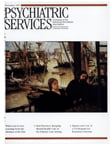Factors in the quality of patient evaluations in general hospital psychiatric emergency services
Abstract
OBJECTIVES: The study examined the usefulness of a three-perspective model for determining the quality of evaluations in psychiatric emergency services. The model was used to evaluate the hypothesis that the provision of high-quality care in emergency services is primarily influenced by service objectives related to patients' clinical characteristics rather than by institutional constraints, such as workload or physical facilities, or by social biases, such as clinicians' attitudes toward patients or perceptions of community expectations. METHODS: The evaluation of 683 persons assessed in nine California public facilities were independently observed. Multivariate techniques were used to test the relative importance of patients' clinical characteristics, possible sources of social bias among clinicians, and institutional constraints in influencing three quality- of-care dimensions: technical quality, the art of patient care, and optimum investment of time. RESULTS: The findings generally confirmed the hypothesis that patients' clinical characteristics have more influence on the quality of care provided than institutional constraints or social biases. However, one institutional constraint-- increased workload demands--led to reduced technical quality and to less than optimal use of time. Further, social biases reflected in the clinician's like for and preconceptions about the patient also influenced the quality of their evaluations. CONCLUSIONS: The model is a useful tool for examining quality of care in the psychiatric emergency service. Increasing workload pressures negatively affect quality of care.
Access content
To read the fulltext, please use one of the options below to sign in or purchase access.- Personal login
- Institutional Login
- Sign in via OpenAthens
- Register for access
-
Please login/register if you wish to pair your device and check access availability.
Not a subscriber?
PsychiatryOnline subscription options offer access to the DSM-5 library, books, journals, CME, and patient resources. This all-in-one virtual library provides psychiatrists and mental health professionals with key resources for diagnosis, treatment, research, and professional development.
Need more help? PsychiatryOnline Customer Service may be reached by emailing [email protected] or by calling 800-368-5777 (in the U.S.) or 703-907-7322 (outside the U.S.).



